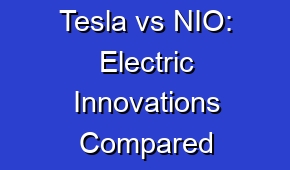Eco-Friendly Cars: Top Brands for Sustainable Driving

Eco-friendly cars are becoming increasingly popular as people strive to reduce their carbon footprint. In this article, we will explore the leading brands that are paving the way in sustainable transportation. Discover which car manufacturers are at the forefront of the eco-friendly revolution and learn about their innovative technologies and features.
Eco-friendly cars are becoming increasingly popular as people seek more sustainable transportation options. Leading brands in the market offer a range of eco-friendly cars that combine cutting-edge technology with environmental consciousness. These leading brands prioritize energy efficiency, reduced emissions, and the use of renewable materials in their vehicle designs. With a focus on sustainability, they are paving the way for a greener future in the automotive industry. These eco-friendly cars not only help to reduce carbon footprint but also provide drivers with a smooth and enjoyable driving experience. The leading brands understand the importance of eco-consciousness and are committed to developing innovative solutions that promote a cleaner environment. Investing in an eco-friendly car from one of these leading brands not only benefits the planet but also allows individuals to make a positive impact while enjoying the latest advancements in automotive technology.
| Eco-friendly cars: leading brands prioritize sustainability and reduced carbon emissions. |
| Toyota: a renowned brand known for its hybrid and electric vehicle options. |
| Tesla: a pioneer in electric vehicles, offering high-performance and eco-friendly cars. |
| Nissan: known for its Leaf model, a popular electric car with impressive range. |
| BMW: offers a range of plug-in hybrid models combining performance and sustainability. |
- Chevrolet: committed to producing eco-friendly cars, such as the Bolt EV.
- Hyundai: offers various eco-friendly models, including the Ioniq Electric and Kona Electric.
- Honda: known for its hybrid models like the Accord Hybrid and Insight.
- Ford: focuses on sustainable mobility with options like the Mustang Mach-E electric SUV.
- Volkswagen: aims to become a leader in electric vehicles with models like the ID.4.
What are the top eco-friendly car brands?
Eco-friendly car brands are becoming increasingly popular as people prioritize sustainability and reducing their carbon footprint. Some of the leading brands in this category include Tesla, Toyota, Nissan, BMW, Chevrolet, Hyundai, and Ford. These brands offer a range of electric and hybrid vehicles that are designed to be more fuel-efficient and emit fewer greenhouse gases compared to traditional gasoline-powered cars.
| Brand | Eco-Friendly Features | Popular Models |
| Toyota | Hybrid and electric vehicle options | Toyota Prius, Toyota Camry Hybrid |
| Tesla | 100% electric vehicles | Tesla Model S, Tesla Model 3 |
| Nissan | Electric vehicle options | Nissan Leaf |
What are the benefits of owning an eco-friendly car?
Owning an eco-friendly car comes with several benefits. Firstly, these cars are more fuel-efficient, which means you can save money on fuel costs in the long run. Additionally, they produce lower emissions, helping to reduce air pollution and combat climate change. Eco-friendly cars also tend to have advanced technologies and features that enhance safety and provide a smoother driving experience. Moreover, some countries offer incentives such as tax credits or rebates for purchasing eco-friendly vehicles, further increasing their appeal.
- Reduced emissions: Eco-friendly cars are designed to have lower emissions compared to traditional gasoline-powered cars. They use alternative fuels such as electricity or biofuels, which produce fewer greenhouse gases. This helps to reduce air pollution and combat climate change.
- Cost savings: Owning an eco-friendly car can lead to significant cost savings in the long run. These cars typically have higher fuel efficiency, which means you’ll spend less money on fuel. Additionally, some countries offer incentives and tax breaks for purchasing eco-friendly vehicles, further reducing the overall cost of ownership.
- Health benefits: Eco-friendly cars contribute to improved air quality, which has direct health benefits for individuals and communities. By reducing harmful emissions, these cars help to decrease the risk of respiratory problems, allergies, and other health issues caused by air pollution.
Are eco-friendly cars more expensive than traditional cars?
Eco-friendly cars generally have a higher upfront cost compared to traditional cars due to the advanced technologies and components they incorporate. However, it’s important to consider the long-term savings on fuel costs and potential incentives or tax benefits that may offset the initial investment. Additionally, as demand for eco-friendly cars continues to grow and technology advances, prices are expected to become more competitive in the future.
- Eco-friendly cars tend to have higher upfront costs due to the technology and materials used in their production.
- However, eco-friendly cars often have lower operating costs as they are more fuel-efficient and require less maintenance.
- In some cases, government incentives and tax credits can help offset the higher initial price of eco-friendly cars, making them more affordable in the long run.
- As the demand for eco-friendly cars increases, the economies of scale may lead to a decrease in their prices over time.
- Additionally, advancements in technology and competition among manufacturers are driving down the costs of eco-friendly car components, making them more affordable.
What is the difference between electric and hybrid cars?
The main difference between electric and hybrid cars lies in their power sources. Electric cars run solely on electricity stored in rechargeable batteries and do not require any gasoline or diesel fuel. On the other hand, hybrid cars combine an internal combustion engine with an electric motor and a battery pack. They can operate using either the electric motor, the combustion engine, or a combination of both, depending on driving conditions. Hybrid cars are generally more fuel-efficient than traditional cars but offer less range compared to fully electric vehicles.
| Electric Cars | Hybrid Cars |
| Run solely on electricity stored in batteries. | Combine an internal combustion engine with an electric motor and a battery. |
| Do not produce tailpipe emissions. | Produce fewer emissions compared to conventional cars. |
| Require charging at charging stations or using a home charging unit. | Do not need to be plugged in as they can self-charge through regenerative braking and the internal combustion engine. |
How do eco-friendly cars contribute to reducing greenhouse gas emissions?
Eco-friendly cars play a crucial role in reducing greenhouse gas emissions, which are a major contributor to climate change. Electric cars produce zero tailpipe emissions since they run entirely on electricity. Hybrid cars emit lower levels of greenhouse gases compared to conventional vehicles due to their improved fuel efficiency and ability to operate on electric power. By transitioning to eco-friendly cars, individuals can significantly reduce their carbon footprint and contribute to a more sustainable future.
Eco-friendly cars contribute to reducing greenhouse gas emissions by using alternative fuels and producing fewer harmful exhaust emissions.
What is the charging infrastructure like for electric cars?
The charging infrastructure for electric cars has been rapidly expanding in recent years. Many countries and cities have implemented public charging stations in various locations such as parking lots, shopping centers, and highways. Additionally, home charging solutions are available, allowing electric car owners to conveniently charge their vehicles overnight. The charging time can vary depending on the charger’s power output and the car’s battery capacity, but advancements in technology are continually improving charging speeds.
The charging infrastructure for electric cars is rapidly expanding, with an increasing number of charging stations available worldwide.
Are there any government incentives for purchasing eco-friendly cars?
Several governments around the world offer incentives to encourage the purchase of eco-friendly cars. These incentives can include tax credits, rebates, grants, or subsidies that help offset the higher upfront cost of these vehicles. Additionally, some regions provide benefits such as reduced toll fees, free parking, or access to carpool lanes for eco-friendly car owners. It’s advisable to research the specific incentives available in your country or region to take advantage of potential cost savings when purchasing an eco-friendly car.
1. Tax Incentives
Purchasing an eco-friendly car can make you eligible for tax incentives provided by the government. These incentives are aimed at promoting the use of environmentally friendly vehicles and reducing carbon emissions. The specific tax incentives can vary depending on your country or region, but they often include exemptions or reductions in sales tax, registration fees, or vehicle license taxes. These incentives can significantly reduce the overall cost of purchasing an eco-friendly car.
2. Rebates and Grants
Many governments offer rebates or grants to individuals who purchase eco-friendly cars. These financial incentives are typically provided as a way to encourage the adoption of electric vehicles or other low-emission vehicles. The rebates can be in the form of cash back or direct payments, while grants may cover a portion of the vehicle’s purchase price. The availability and amount of rebates and grants can vary by country or even within different states or provinces.
3. Access to HOV Lanes and Parking Benefits
In some regions, owners of eco-friendly cars can enjoy additional perks such as access to High Occupancy Vehicle (HOV) lanes and preferential parking. HOV lanes are typically less congested and can help reduce commute times. By allowing eco-friendly car owners to use these lanes, governments aim to incentivize the purchase of such vehicles. Additionally, designated parking spots or reduced parking fees may be offered to eco-friendly car owners, making it more convenient and cost-effective to own and operate these vehicles.





















